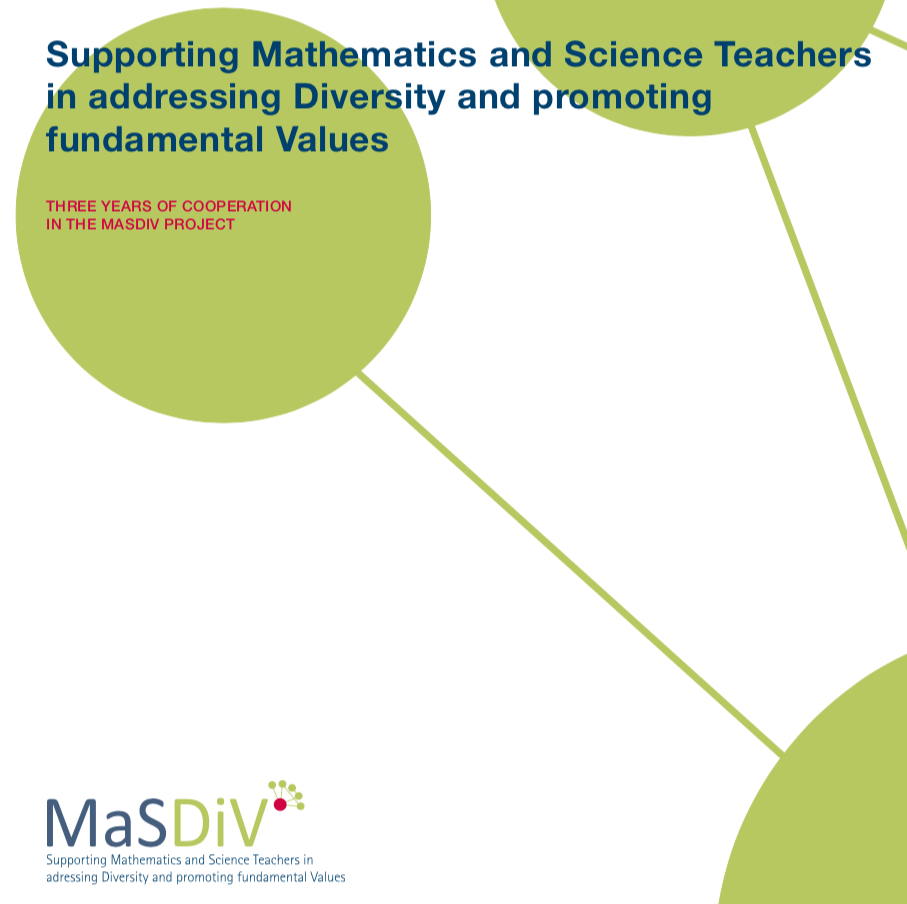MaSDiV – Supporting mathematics and science teachers in addressing diversity and promoting fundamental values

|
Erasmus+ project 2017-2019
|
Three modules for professional development
Developed for STEM teachers secondary education
Module 1
Diversity and achievement in science and mathematics classrooms
Module 2
Diversity and relevant contexts in science and mathematics classrooms
Module 3
Science, mathematics, diversity and IBL in multicultural settings
The aim of the policy measure is to support STEM teachers (in line with ET 2020 priorities) in ensuring basic skills for all learners and in promoting fundamental democratic values through intercultural learning, respecting diversity, engaging in critical thinking and exercise judgement (Paris declaration). To reach this aim we will set up regional, specialised mathematics & science professional development (PD) centres (or attach them to existing centres) which will provide this support to teachers. These PD centres will conceptualise and offer innovative professional development courses for science and mathematics in-service teachers addressing cultural diversity.
- Official Title: Supporting mathematics and science teachers in addressing diversity and promoting fundamental values
- Proposal 13-4-2016, Project duration 1-2-2017 to 1-2-2020
- Erasmus+ Programme, Key Action 3: support for policy reform — initiatives for policy innovation, European policy experimentations in the fields of education, training and youth led by high-level 2015/C 415/08
- Ascher, M. (1988). Graphs in Cultures: A Study in Ethnomathematics (PDF) HISTORIA MATHEMATICA, 15, 201-227
- Ascher, M. (1991). Ethnomathematics. A Multicultural View of Mathematical Ideas (PDF). Belmont, California: Wadsworth, Inc.
- Banks, J. A. (1993). Multicultural Education: Historical Development, Dimensions, and Practice (PDF) Review of Research in Education, 19(1993), 3-49
- Barton, B. (1996). Making sense of ethnomathematics: Ethnomathematics is making sense (PDF) Educational Studies in Mathematics, 31, 201-233. 10.1007/BF00143932
- Bennett, J., Lubben, F. and Hogarth, S. (2007). Bringing science to life: A synthesis of the research evidence on the effects of context-based and STS approaches to science teaching (PDF) Science Education, 91, 347 – 370. 10.1002/sce.20186
- Bishop, A. J. (1991). Mathematical Enculturation. A Cultural Perspective on Mathematics Education (PDF). Dordrecht: Springer.
- Booth, T. and Ainscrow, M. (2002). Index for inclusion – developing learning and participation (PDF). Bristol: Centre for Studies on Inclusive Education (CSIE).
- Brown, P. L. (2007). Cultural Diversity in the Science Classroom (PDF) Science and Children, Summer 2007, 60-61
- De Jong, E. M., Jellesma, F. C., Koomen, H. M. and De Jong, P. F. (2016). A values-affirmation intervention does not benefit negatively stereotyped immigrant students in the Netherlands (PDF) Frontiers in psychology, 7. 10.3389/fpsyg.2016.00691
- Geerlings, J., Thijs, J. and Verkuyten, M. (2017). Student-teacher relationships and ethnic outgroup attitudes among majority students Journal of Applied Developmental Psychology, 52(69–79). 10.1016/j.appdev.2017.07.002
- Gilbert, J. (2006). On the nature of ‘context’ in chemical education (PDF) International Journal of Science Education, 28(9), 957-976
- Hazelkorn, E. (2015). Science education for Responsible Citizenship (PDF) (pp. 88). Brussels: European Commission.
- Jussim, L. and Harber, K. D. (2005). Teacher expectations and self-fulfilling prophecies: Knowns and unknowns, resolved and unresolved controversies Personality and social psychology review, 9(2), 131-155
- Ladson-Billings, G. J. (1999). Preparing Teachers for Diverse Student Populations: A Critical Race Theory Perspective Review of Research in Education, 24, 211-247
- Leonard, J., Moore, C. M. and Brooks, W. (2013). Multicultural Children’s Literature as a Context for Teaching Mathematics for Cultural Relevance in Urban Schools The Urban Review, September 2013. 10.1007/s11256-013-0264-3
- Lipka, J. (2005). Math in a cultural context: Two case studies of a successful culturally based math project Anthropology and Education Quarterly, 36(4), 367–385
- Matthijsse, W. (1996). Materiaalontwikkeling Procenten Volwasseneneducatie (PDF) Panama-Post. Tijdschrift voor nascholing en onderzoek van het reken-wiskundeonderwijs, 14(3), 12-19
- Milner, H. R. and Smithney, M. (2003). How teacher educators created a course curriculum to challenge and enhance preservice teachers’ thinking and experience with diversity Teaching Education, 14(3), 293-305. 10.1080/1047621032000135195
- Nijboer, Y. L. (2011). The Ethnic Identity and Inter-Ethnic Relations of Primary and Secondary School Students in the Former Yugoslav Republic of Macedonia. A quantitative study & network analysis (pp. 34). Utrecht: Utrecht University.
- Ottevanger, W., Oorschot, F., Spek, W., Boerwinkel, D. J., Eijkelhof, H., De Vries, M., Van der Hoeven, M. and Kuiper, W. (2014). Kennisbasis science onderbouw (PDF) (pp. 176). Enschede: SLO/UU.
- Prediger, S., Clarkson, P. and Bose, A. (2012). A way forward for teaching in multilingual contexts: purposefully relating multi lingual registers. In (PDF). Paper presented at the ICME 12, Seoul, Korea.
- Revina, S. (2017). Influence of Culture on the Adaptation of Realistic Mathematics Education in Indonesia (PDF) (pp. 274). Hong Kong: University of Hong Kong.
- Sieckelinck, S., Kaulingfreks, F. and De Winter, M. (2015). Neither villains nor victims: towards an educational perspective on radicalisation British Journal of Educational Studies, 63(3), 329-343. 10.1080/00071005.2015.1076566
- Van den Bergh, L., Denessen, E., Hornstra, L., Voeten, M. and Holland, R. W. (2010). The implicit prejudiced attitudes of teachers: Relations to teacher expectations and the ethnic achievement gap (PDF) American Educational Research Journal, 47(2), 497-527. 10.3102/0002831209353594
- Van den Bogaart, D. A. (2017). Wortels van de wiskunde Euclides, 92(5), 11-12
- Van San, M., Sieckelinck, S. and Se Winter, M. (2013). Ideals adrift: An educational approach to radicalization Ethics and Education, 8(3), 276-289. 10.1080/17449642.2013.878100



